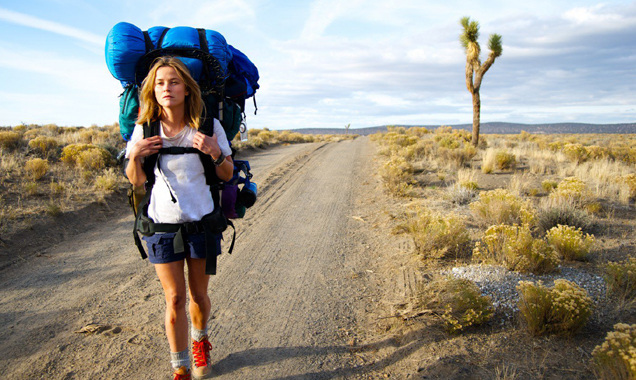It's never directly stated because dialogue is pretty sparse throughout the film, but Strayed is hiking the Pacific Crest Trail to become the woman her mother wanted her to be. Her mother, played by the gifted Laura Dern, was a woman who worked hard in her life despite her abusive environment, and she only expected the same out of her daughter. This is a pretty big idea that trailers and plot summaries don't mention; Laura Dern's maternal presence is in a majority of the film. Because the book it’s based on reminisces on events from her past that have led her to her lengthy journey, Hornby and Vallée utilize flashbacks as the main storytelling device of Wild. It's helpful and really cool in the beginning, when we're all still curious why Strayed would torture herself with a backpack that looks bigger than her. But as the film progresses, it starts to feel like 115 minutes long and the flashbacks interrupt what could be really groundbreaking moments for Strayed's self-development. Quick shots of boobs, shooting heroin, or Dern's kind face interfere with moments that I would like to focus on Witherspoon and her response to these past events. These flashbacks keep happening even in the final acts, when we fully understood why she's doing this hike like 40 minutes ago, and it's like Wild is trying to pull a deeply emotional reaction out of repetitive memories. It starts to feel not so nostalgic anymore, just annoying and rude. The use of these flashbacks is pretty polarizing, and some will find them to be perfectly spliced into the film, but I think a film about self-discovery and renewal should focus more on the present and future than on the same events from the past.
Wild is one of those films where the acting is better than the movie itself, and Reese Witherspoon delivers a strong and natural performance to a Vallée-made character. I loved watching her howl with wolves or get genuinely excited about cooking hot "mush," or just fall onto her knees and break down into tears in a strange rainforest environment. Witherspoon's facial expressions were able to excellently portray the hope and hopelessness that Strayed felt on her course, and her voiceovers, which convey her thoughts, are derisively comical and depict another form of her resilient attitude. Strayed's attitude and her gender are a part of the feminism this film carries, a topic like LGBT in Dallas Buyers Club that Vallée wanted to characterize this time. I'm glad he included it because otherwise the film would have felt totally unrealistic, and the "anything is possible for women" look that Witherspoon has at the end defies any doubts she or readers/viewers had about her making it to the border of Canada.
I wasn't a fan of Yves Bélanger's cinematography work in Wild at first. I thought it was severely lacking in wide-shots of how small Strayed is compared to the vast desert around her, or any really beautiful scenes of the expansive landscape she traveled through. But after much thought, I noticed and appreciated his decision to focus instead on the smaller parts of life through a more microscopic lens. Where a film like Gravity relished in scenes of Sandra Bullock traveling completely alone in an infinite, black "space," Wild wants Witherspoon to feel mighty by showing her as a larger than life creature to all the little rabbits and bugs she meets on her path. Bélanger focuses on symbols like her rugged shoes or makes his audience feel huge by panning over single blades of grass, and it's pretty cool how we can still feel the same kind of loneliness but it's also tinged with a subtle feeling of power. This combination is what defines Wild, a transformation of Strayed from a small female hiker looking for answers to an almost goddess of nature asking the question "What's next?".
Wild is an expedition into the self. It doesn't deserve to be looked over or ignored because Witherspoon delivers her career-best performance, and it's pretty fun to watch her evolve from carrying a tiny pink purse with a chihuahua in Legally Blonde to lugging a massive blue hiking backpack in this movie. Wild will be praised for it's tough female lead and it’s too good to write off as “Oscar bait,” but not quite quality enough to escape the categorization entirely.
C+

 RSS Feed
RSS Feed
